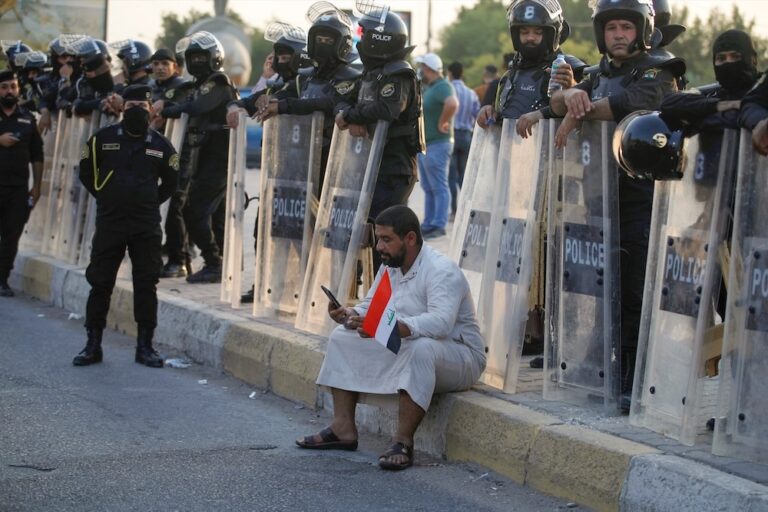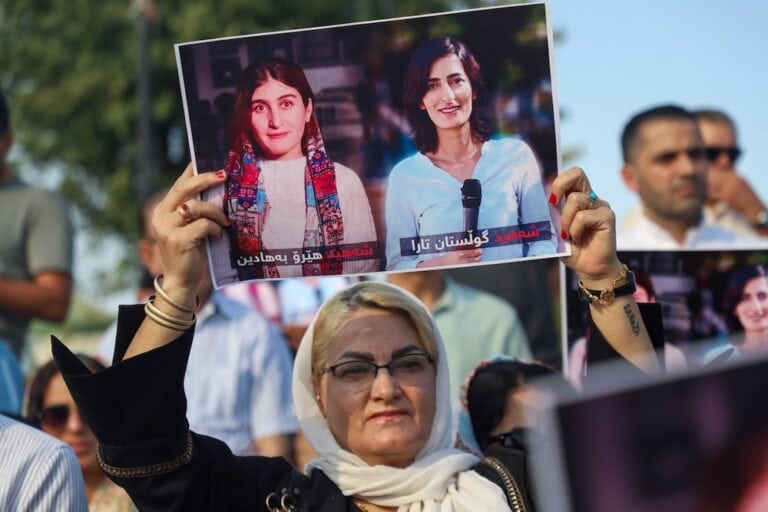(WPFC/IFEX) – The following is a 4 August 2005 WPFC news release: World Press Freedom Committee today announced that they sent last week to Iraqi government officials via both US diplomatic and UN avenues, a resolution of the global Coordinating Committee of Press Freedom Organizations. The resolution calls for inclusion in the Iraqi constitution currently […]
(WPFC/IFEX) – The following is a 4 August 2005 WPFC news release:
World Press Freedom Committee today announced that they sent last week to Iraqi government officials via both US diplomatic and UN avenues, a resolution of the global Coordinating Committee of Press Freedom Organizations. The resolution calls for inclusion in the Iraqi constitution currently being written, guarantees regarding press freedom, stated Mark Bench, Executive Director of WPFC.
The resolution was unanimously agreed upon at the first of the twice-yearly meetings of this Coordinating Committee held earlier this year in Geneva.
The members of the Coordinating Committee of Press Freedom Organizations are the Committee to Protect Journalists, Commonwealth Press Union, Inter American Press Association, International Association of Broadcasting, International Federation of the Periodical Press, International Press Institute, North American Broadcasters Association, World Association of Newspapers and the World Press Freedom Committee.
World Press Freedom Committee, a not-for-profit organization headquartered in Reston, Virginia, has coordinated the meetings of the Coordinating Committee of Press Freedom Organizations since its inception in 1981.
WPFC works with intergovernmental organizations in preventing restrictions on press freedom, and with governments around the world to eliminate insult and criminal defamation laws. Its model amicus curiae brief (located at http://www.wpfc.org under Resources and then under Publications) in both Spanish and English serves as an aid to all journalists and media harassed by their governments for doing their jobs.
The text of the resolution of the global Coordinating Committee of Press Freedom Organizations is as follows:
July 21, 2005
At a meeting in Geneva, Switzerland earlier this year, the global Coordinating Committee of Press Freedom Organizations called upon the newly elected Iraqi assembly to draft a strongly worded constitutional provision to guarantee press freedom in Iraq.
The first duty of Iraq?s newly empowered assembly is to draft a new constitution. Its wording will help set the path Iraq takes in transition from a repressive past towards a democratic future.
If the constitution is to set the scene successfully for a democratic future, it is crucial that it uphold basic rights, foremost among them freedom of the press.
The global Coordinating Committee of Press Freedom Organizations believes that a free press — using print, broadcast and new communications media — is central to any democracy. Charged with holding governments to account, a free press also acts as a vital check on infringements of liberty and enables news and information to flow freely within society.
A free press, unhindered by intimidation and harassment, will help foster the democratic institutions that Iraq needs to develop. A free press will assist in exposing corruption and in encouraging broad political discussion by providing a forum for public debate.
Without a strong, clear, unqualified commitment to a free press, the constitution would be flawed and would risk undermining the goal of fostering democracy in Iraq. Moreover, there is a real danger that, without a robust constitutional guarantee, the numerous press freedom violations, which have occurred in the country since the overthrow of the previous regime, would continue under future Iraqi governments.
Bearing this in mind, the global Coordinating Committee of Press Freedom Organizations calls on the Iraqi assembly to support a constitutional provision on press freedom that is in keeping with the principles enumerated in Article 19 of the United Nations Universal Declaration of Human Rights.
That provision should not merely pay lip service to a free press. In recognition that all rights and duties flow from the constitution, the new assembly should also create an independent legal system whose highest court of appeal would have the power to implement the constitution and censure any official infringements of fundamental rights, notably freedom of expression and freedom of the press.


